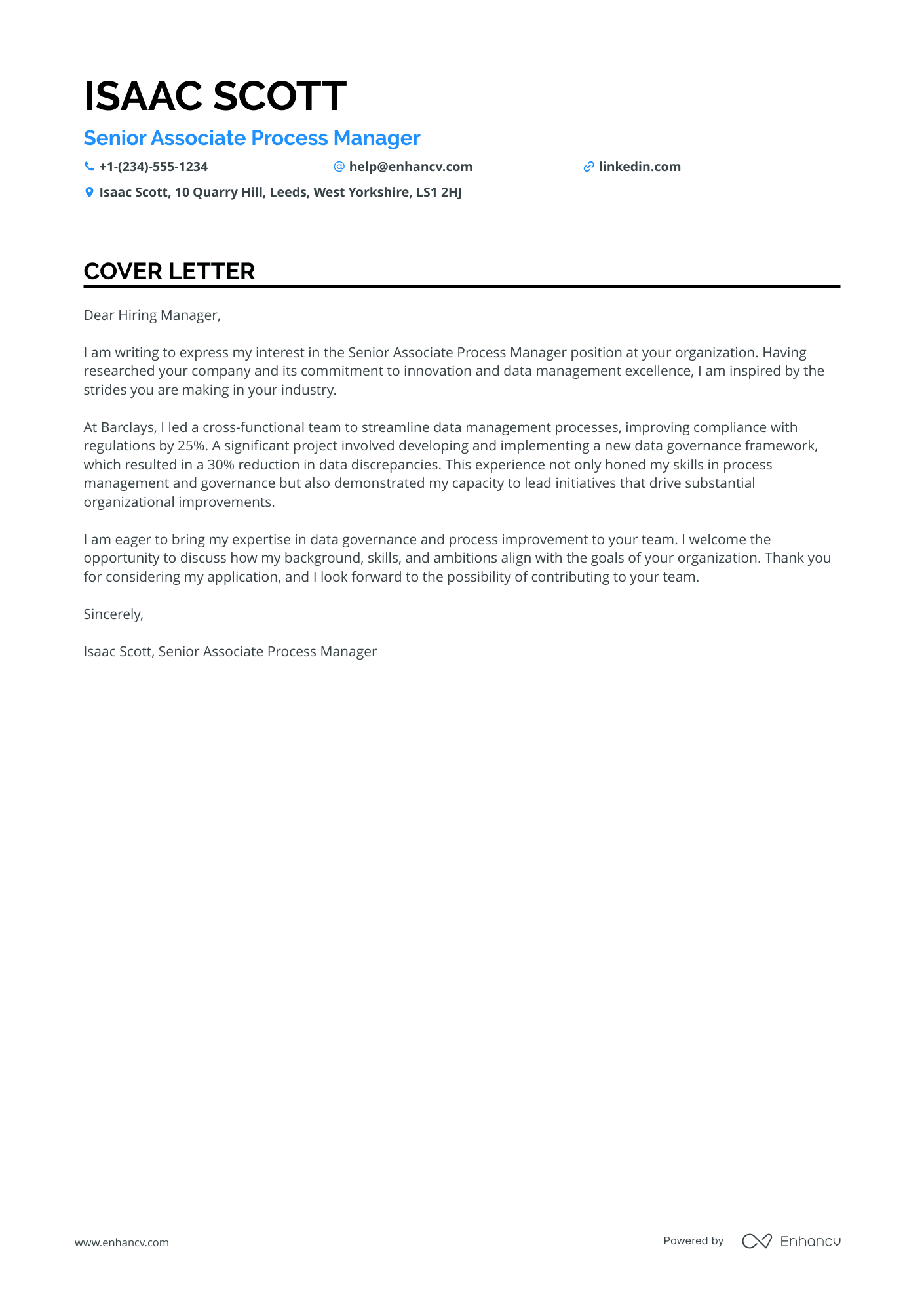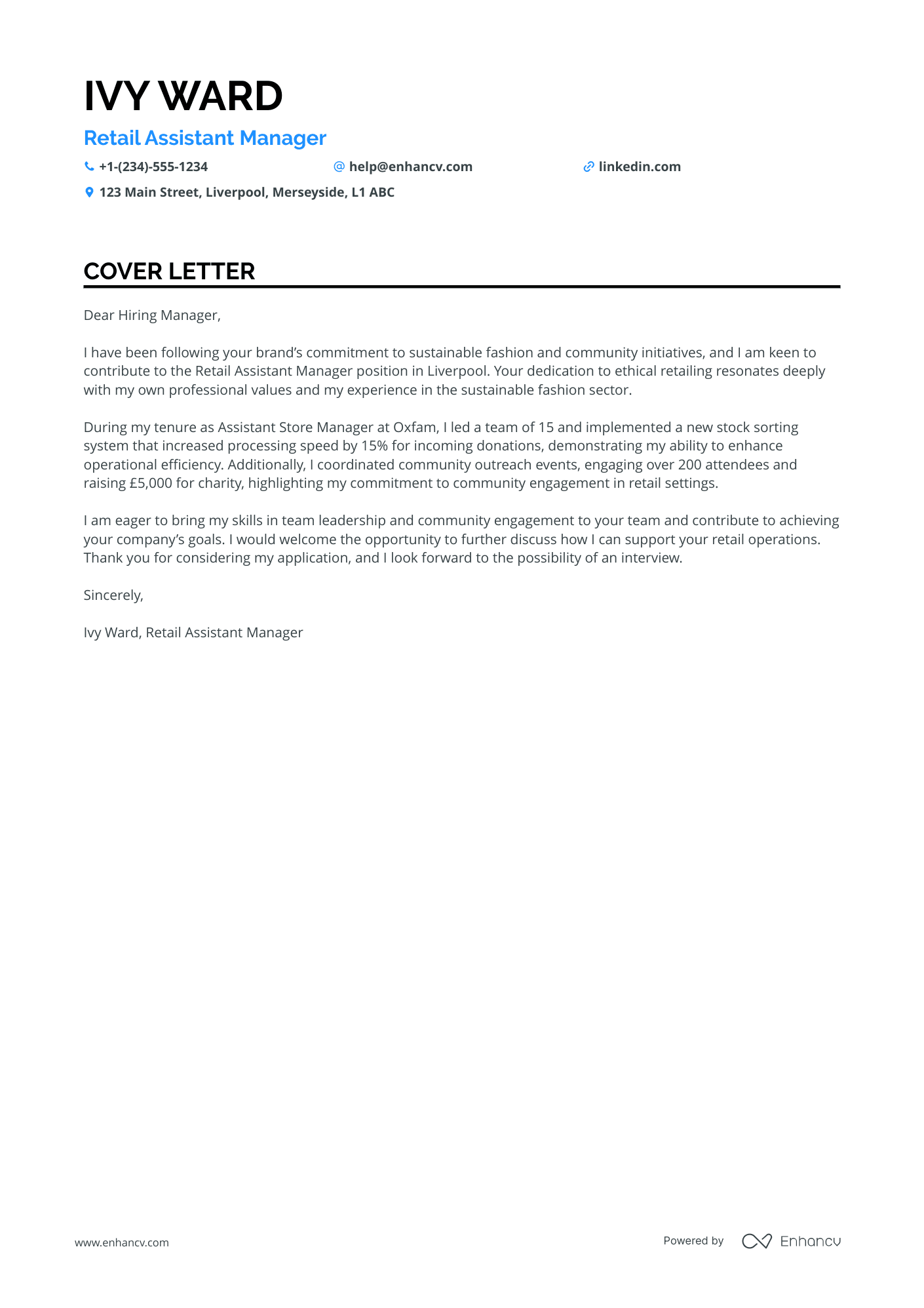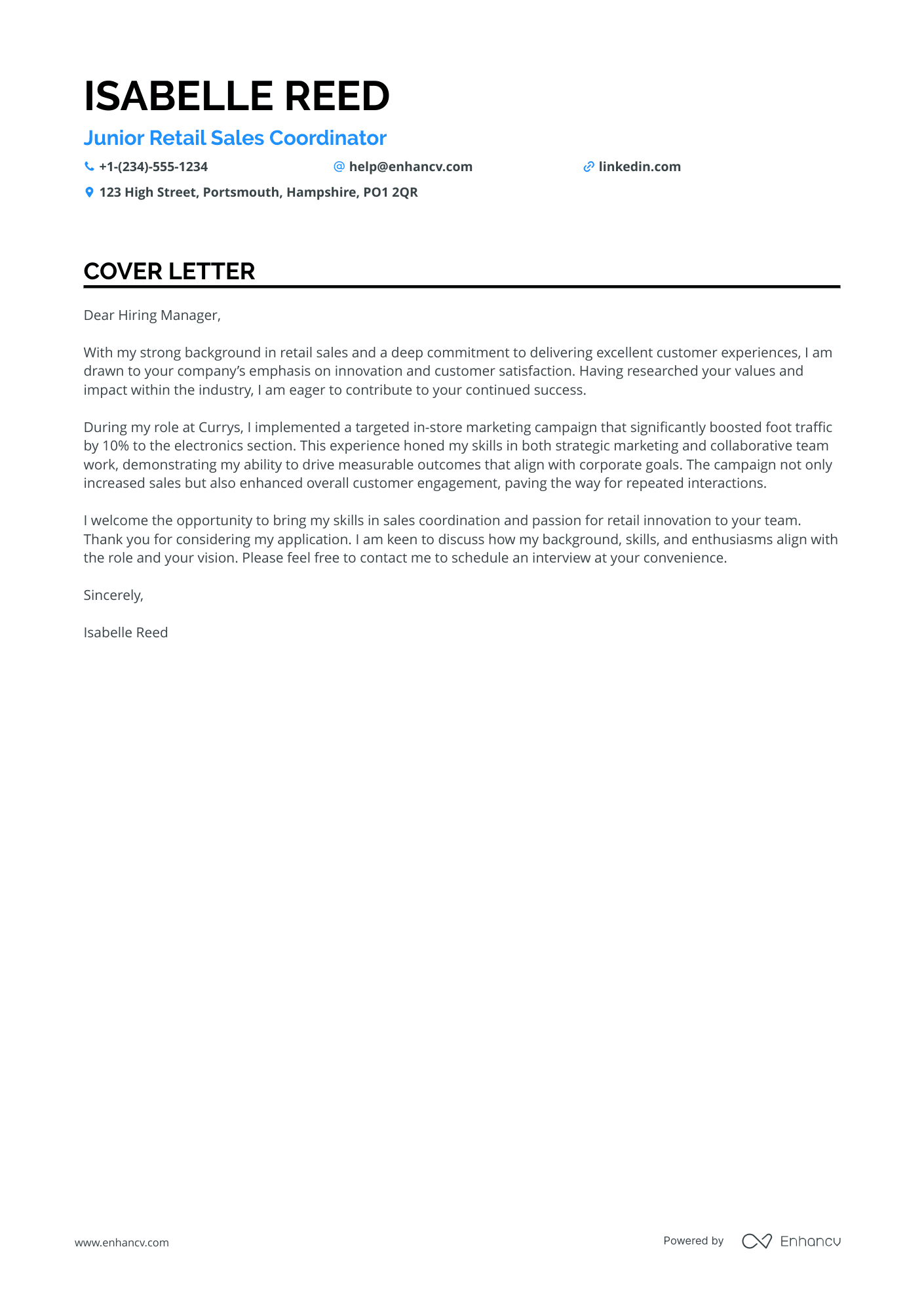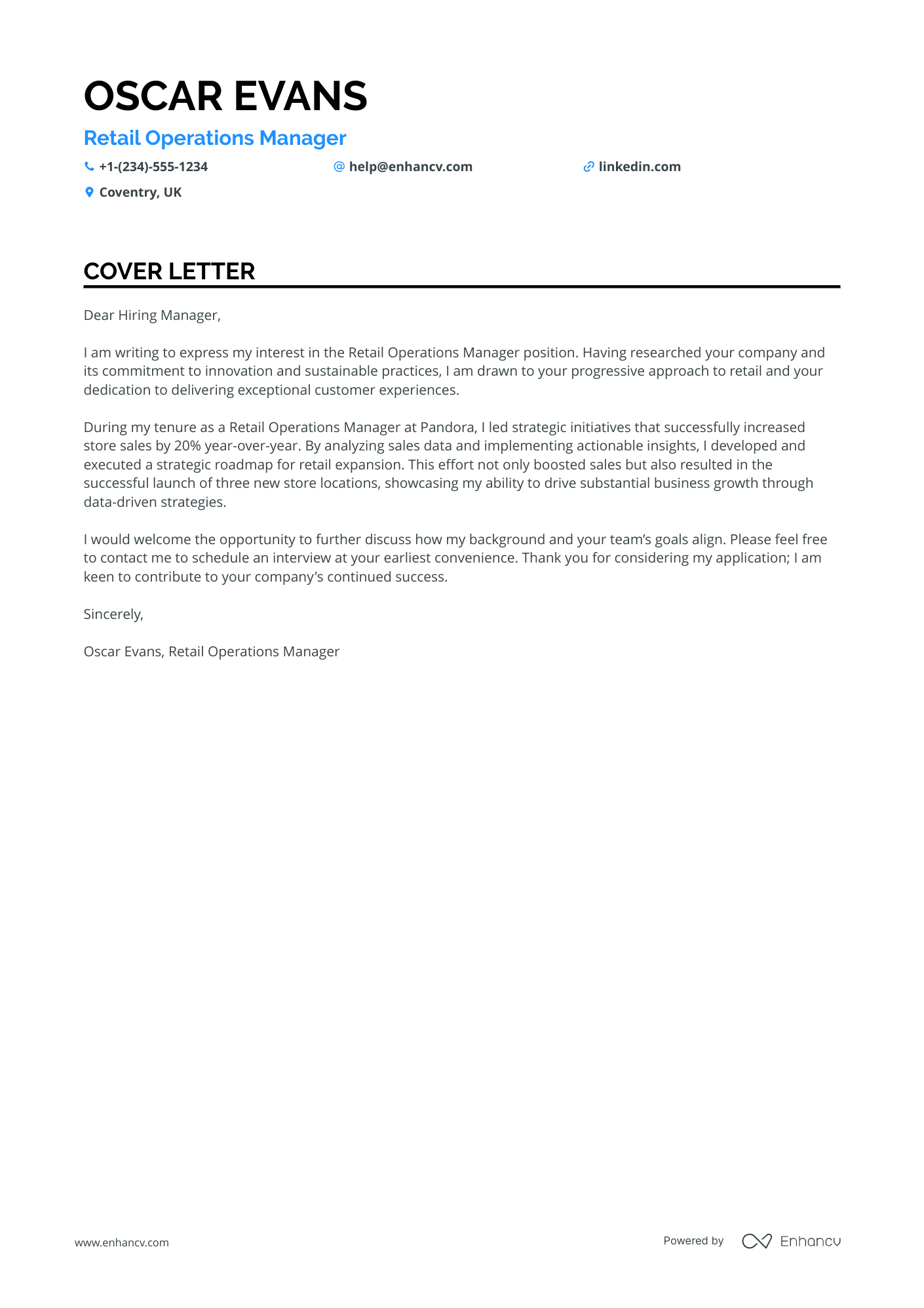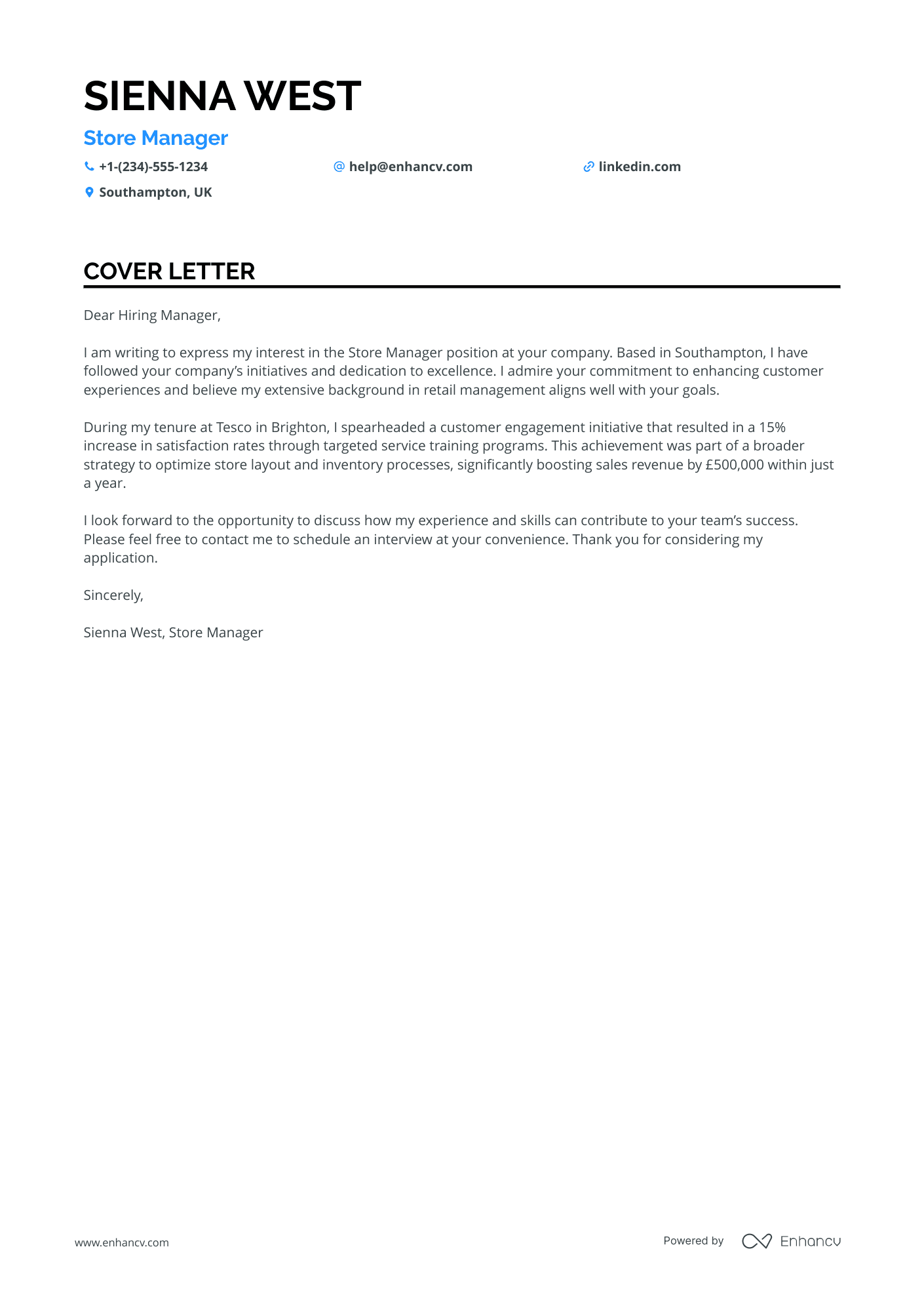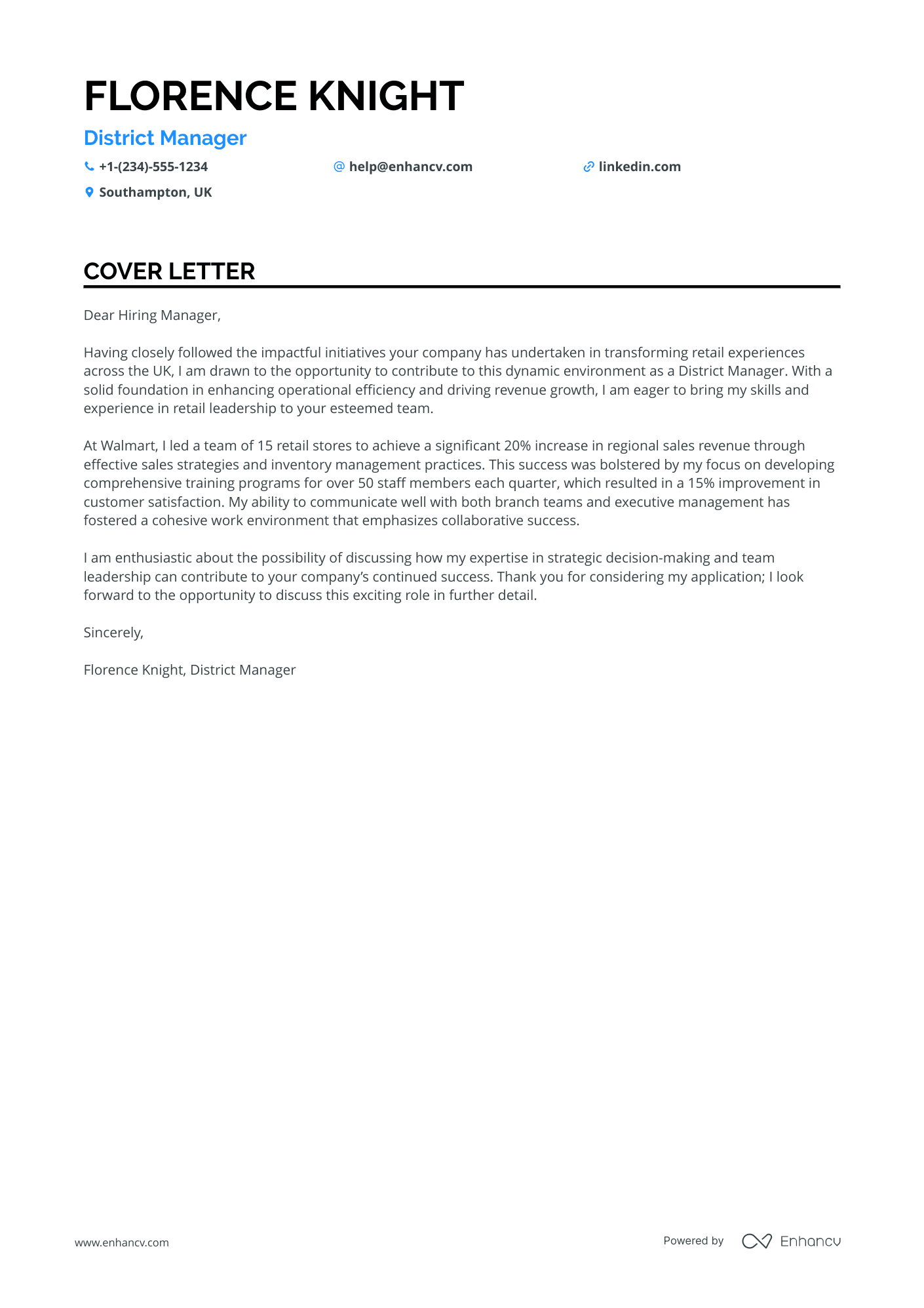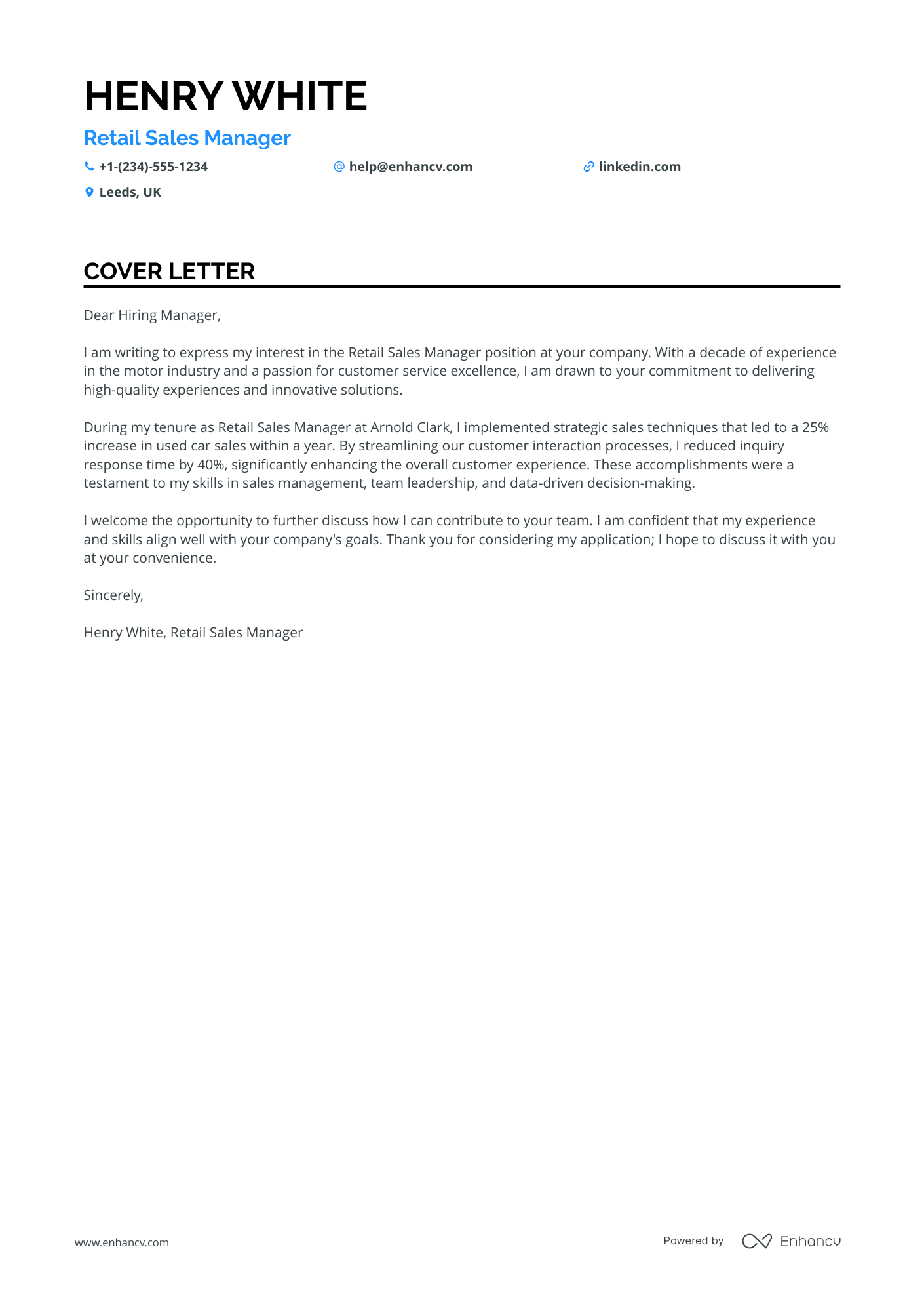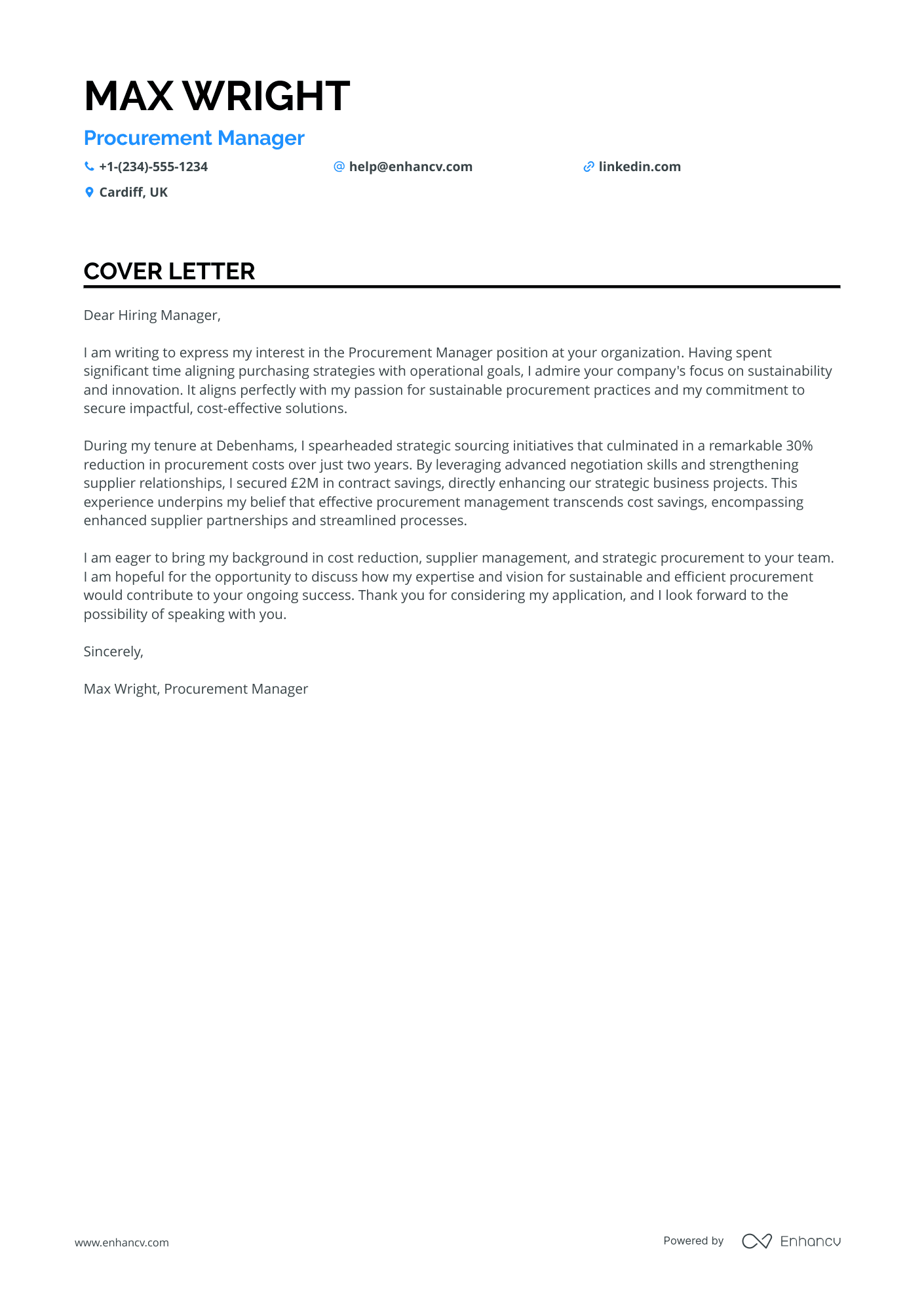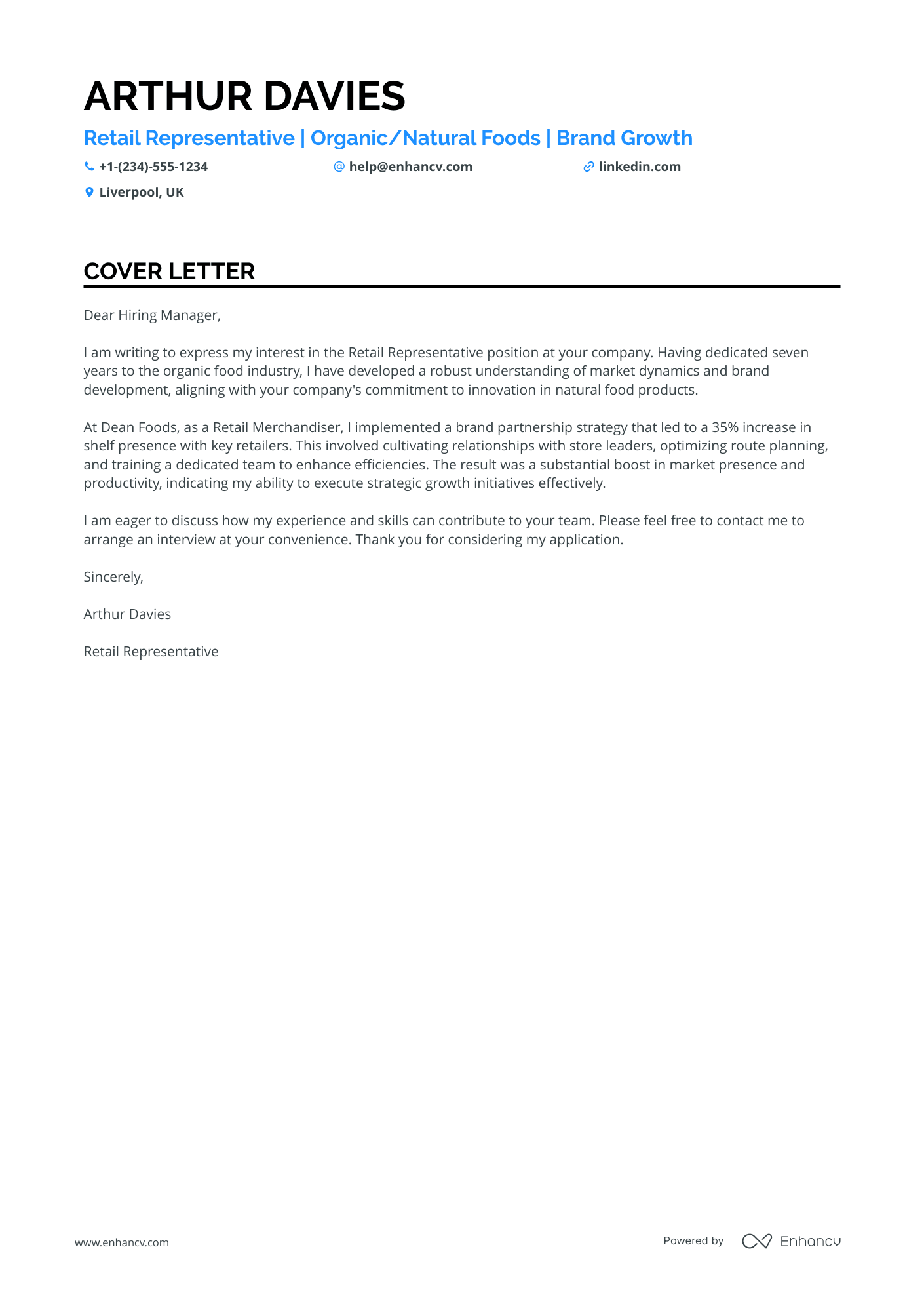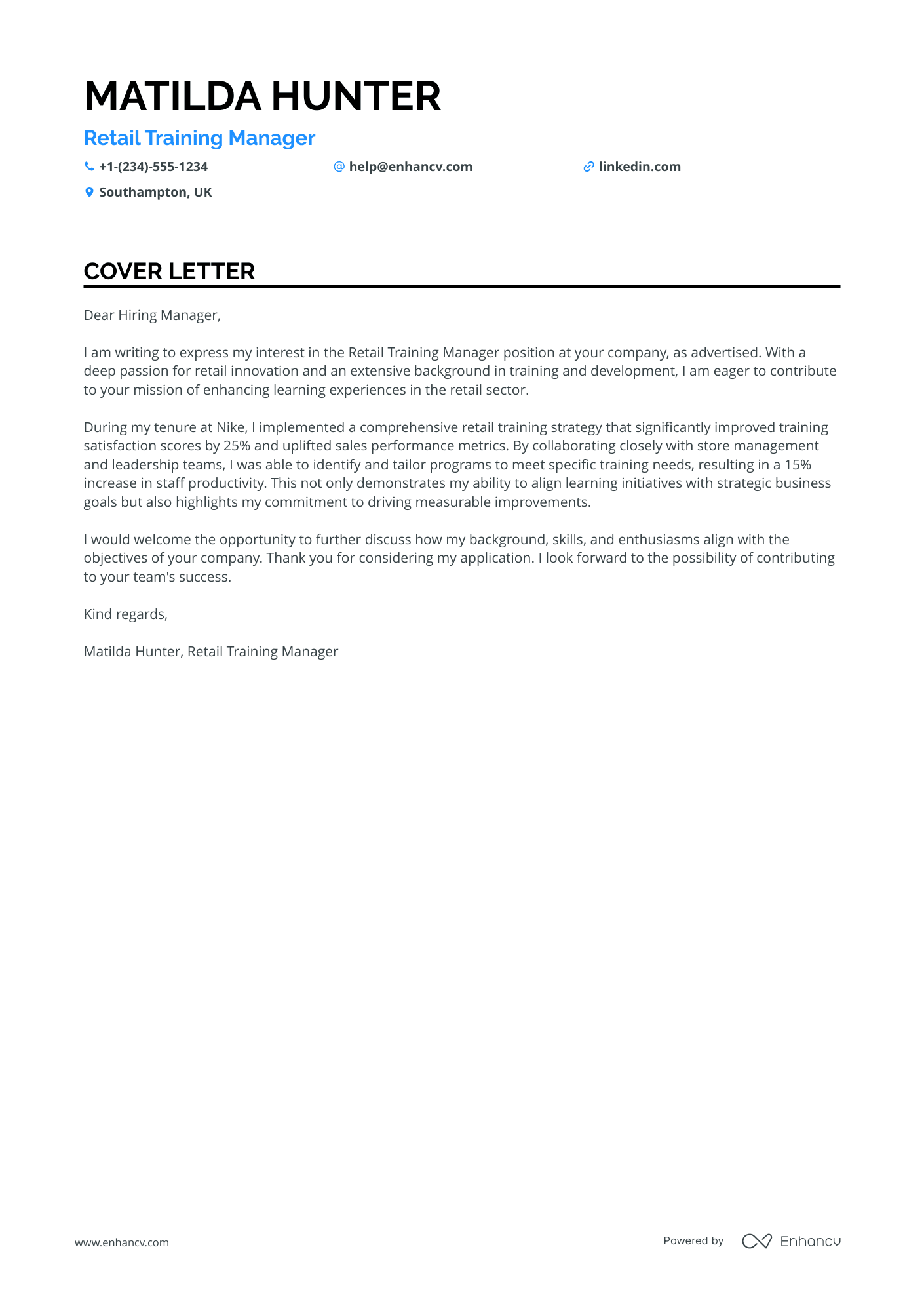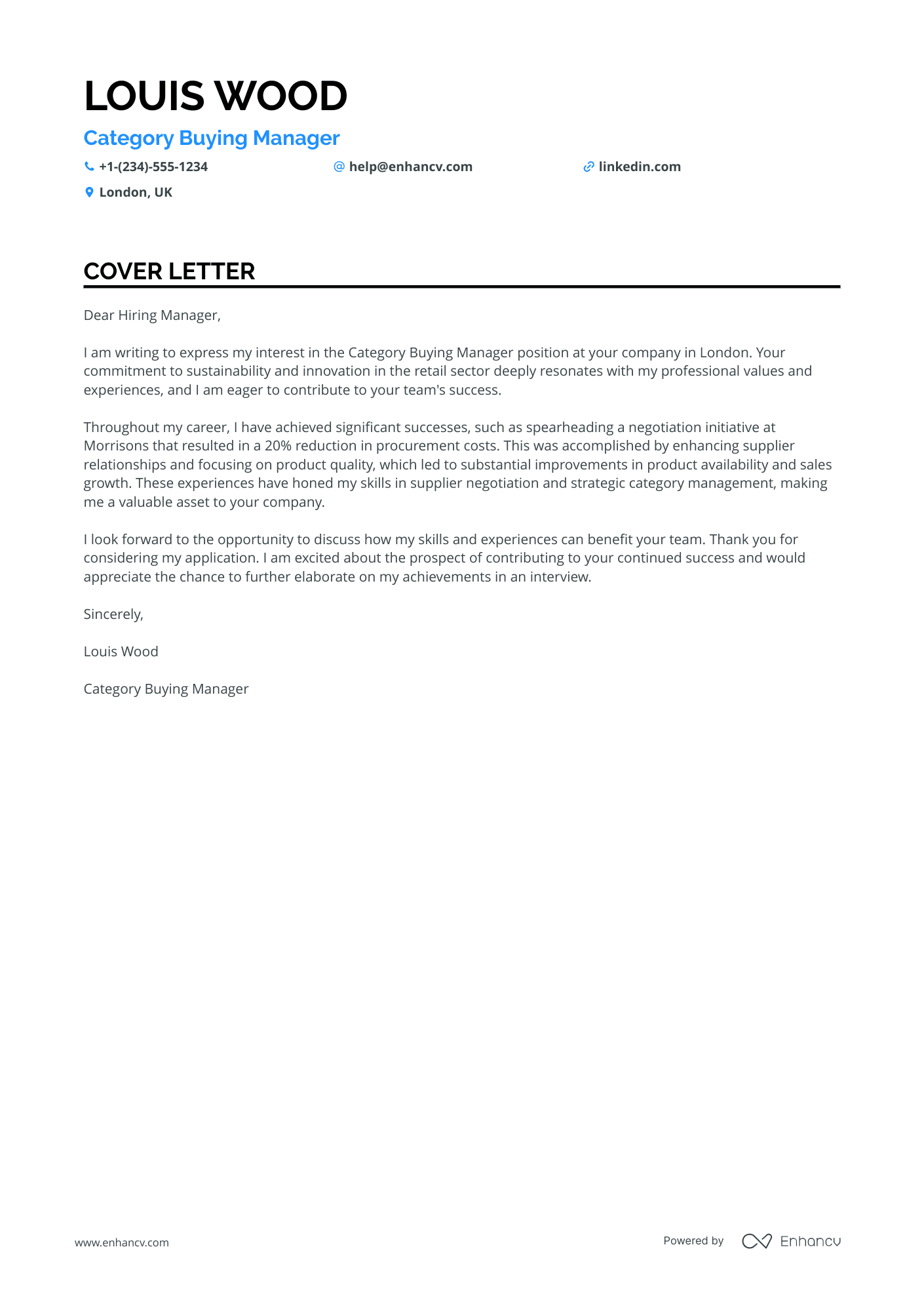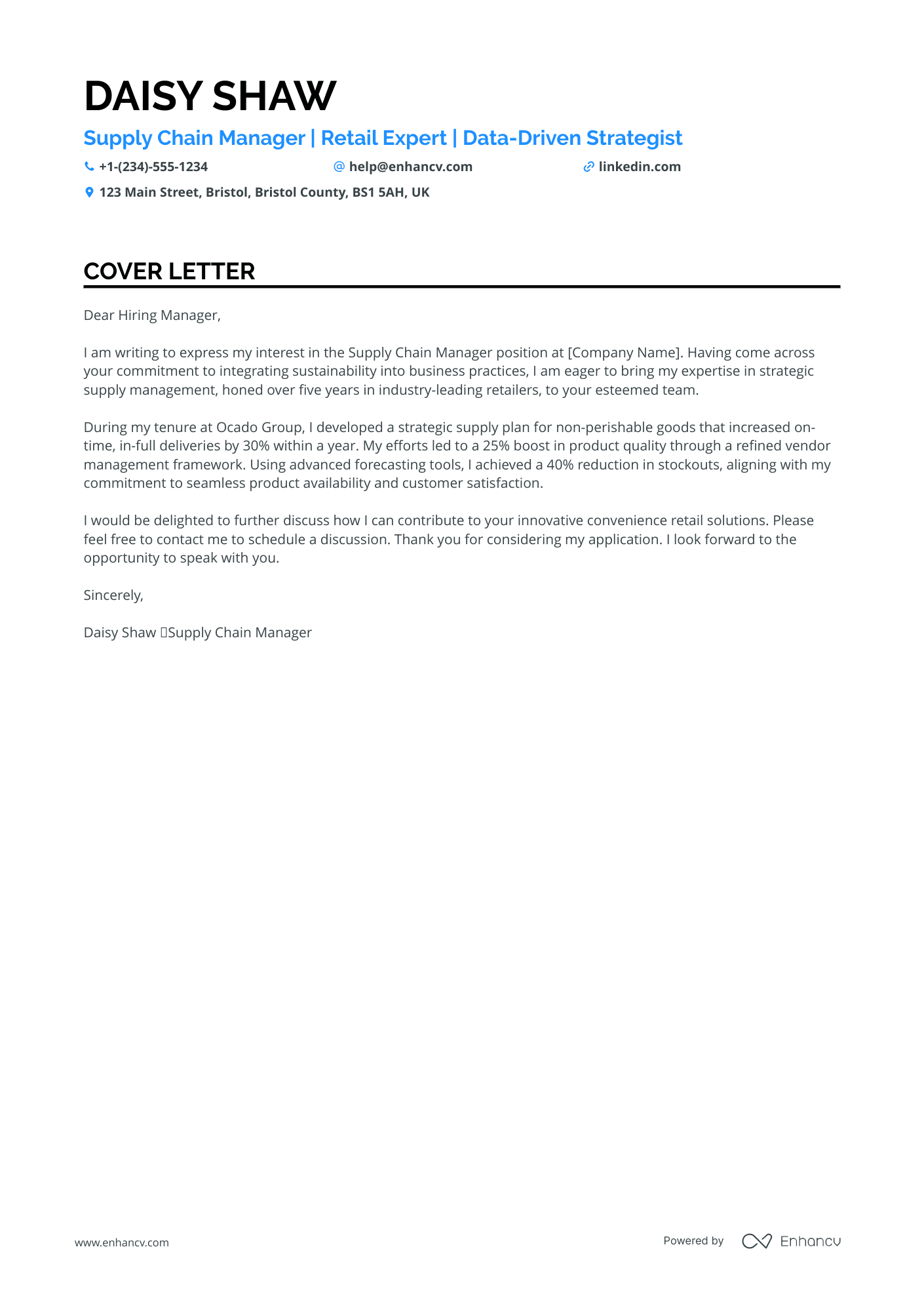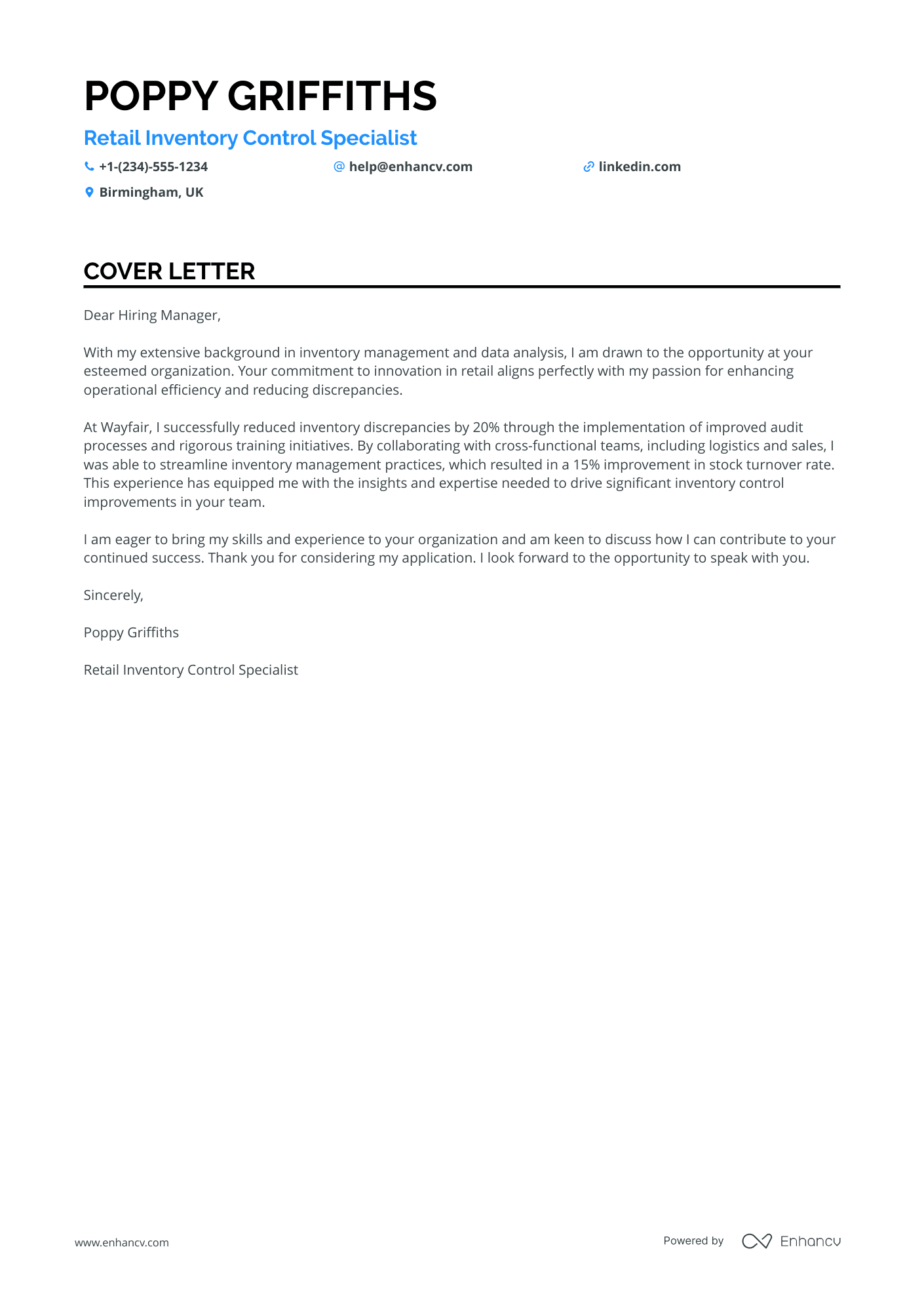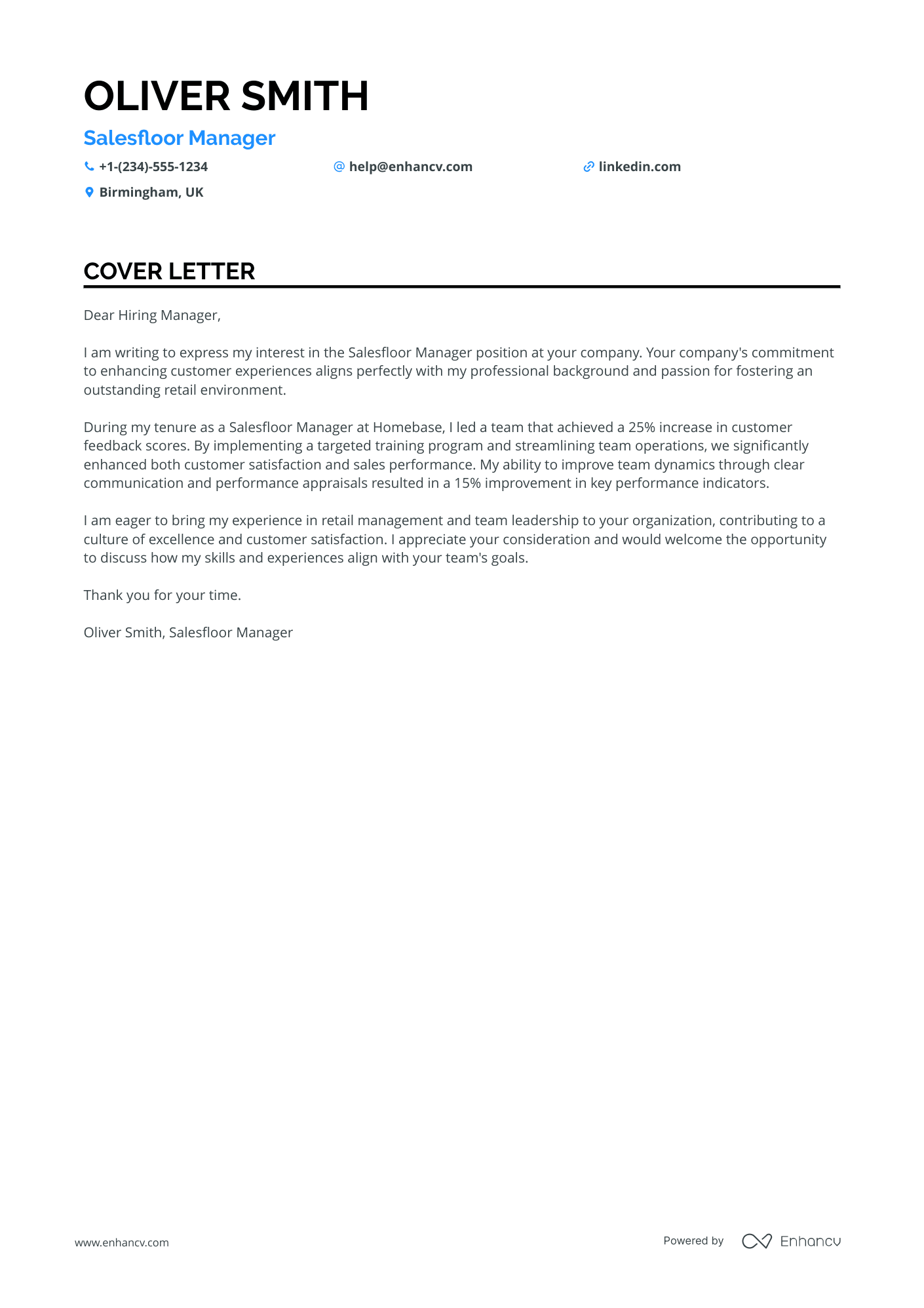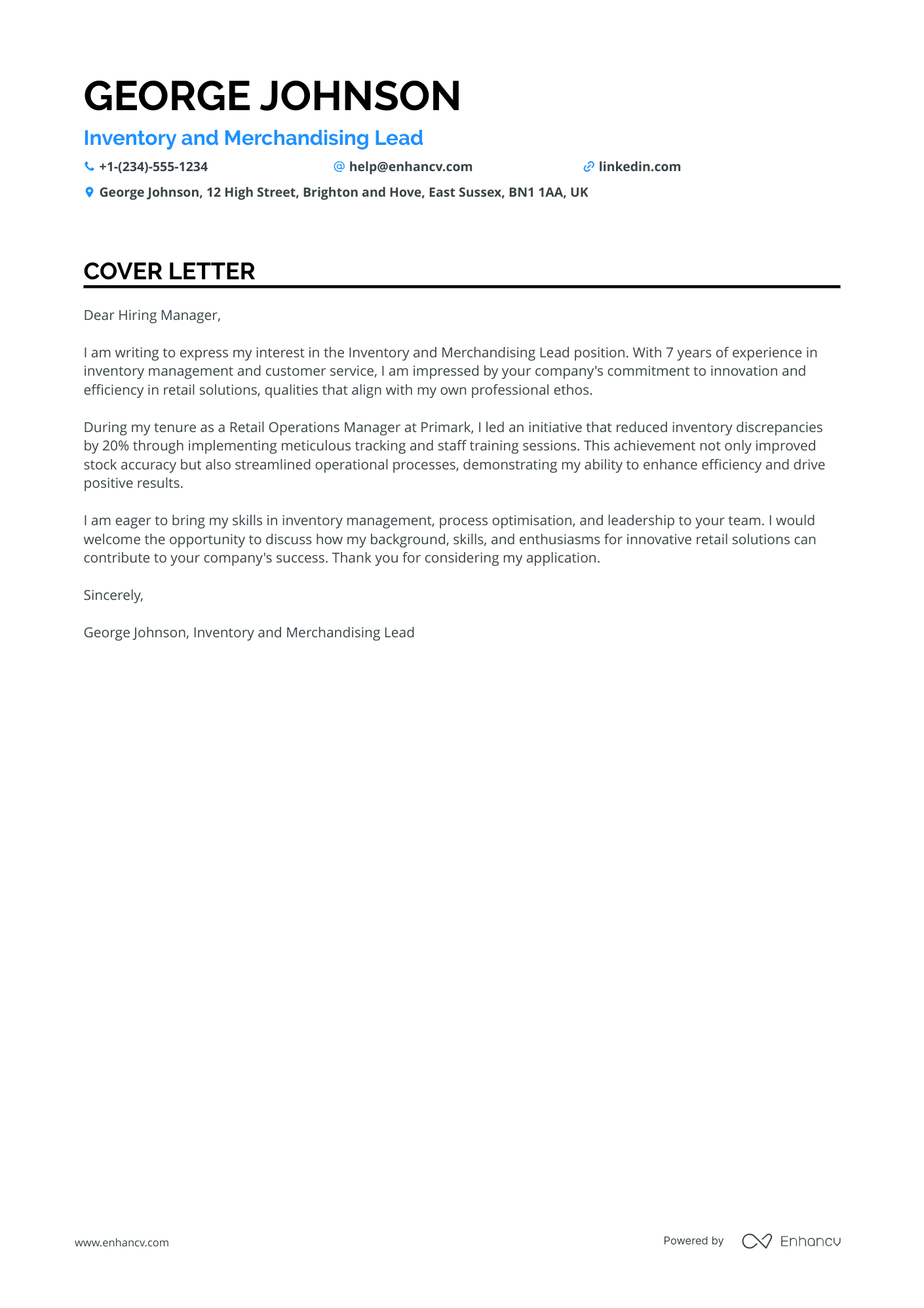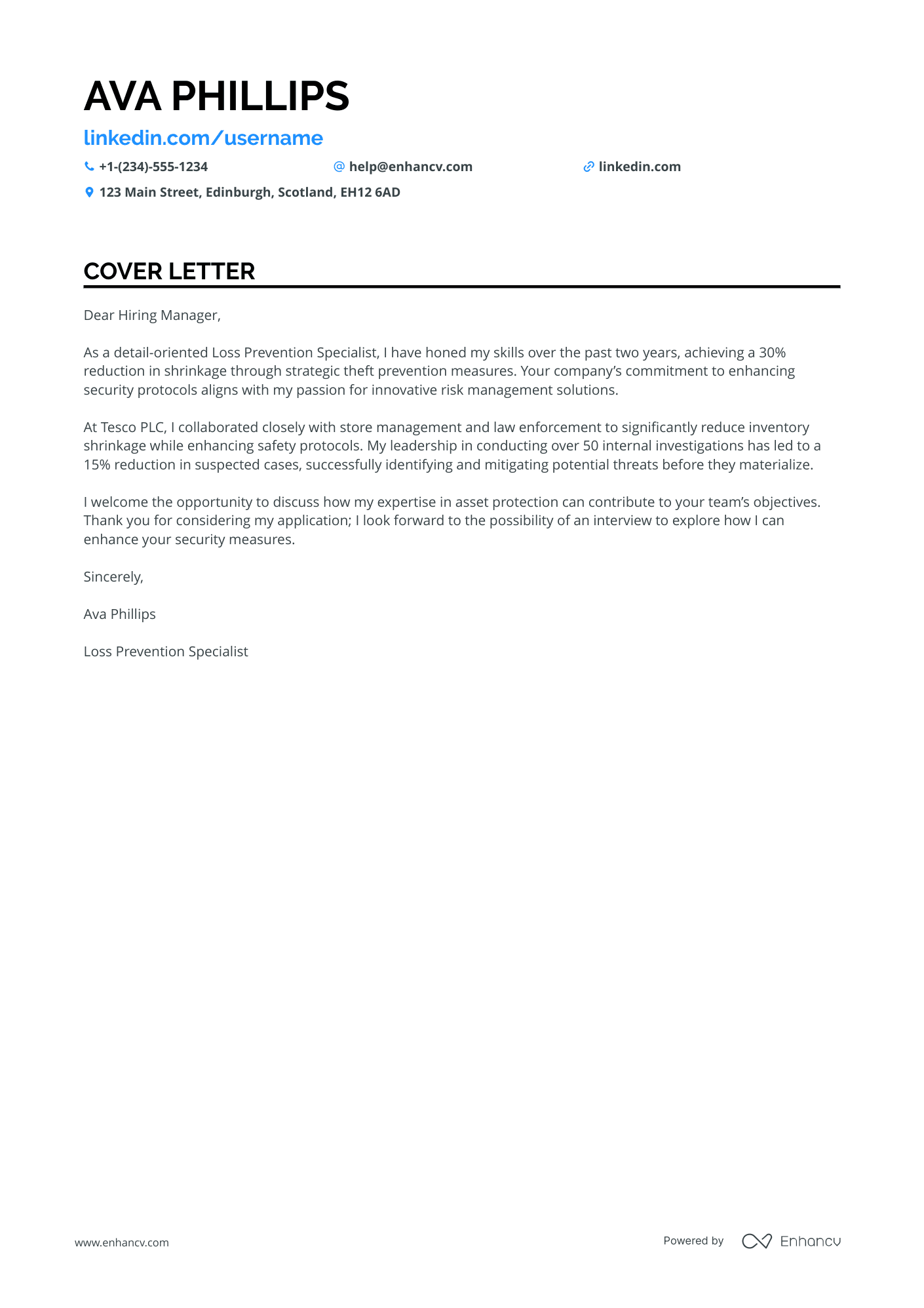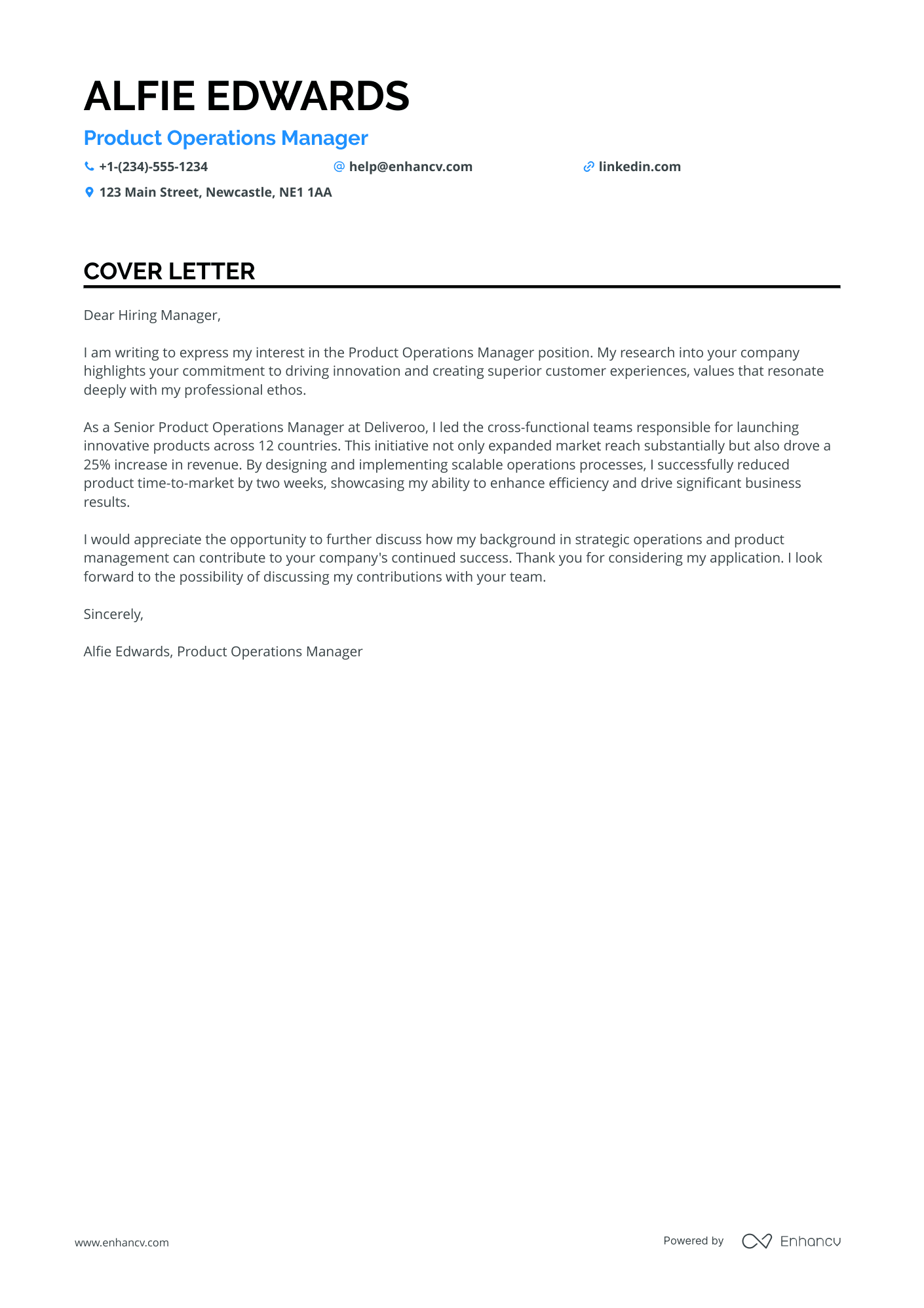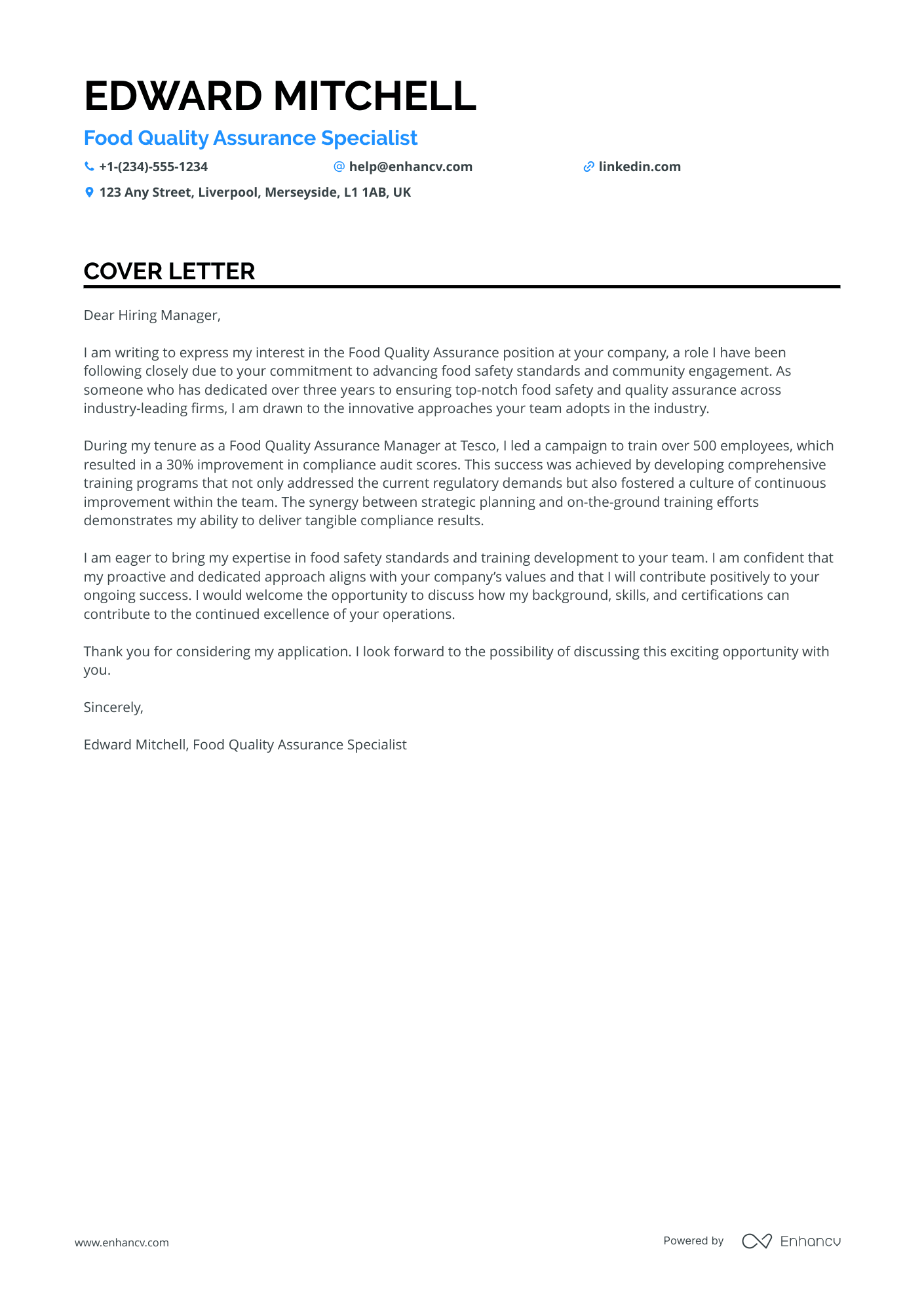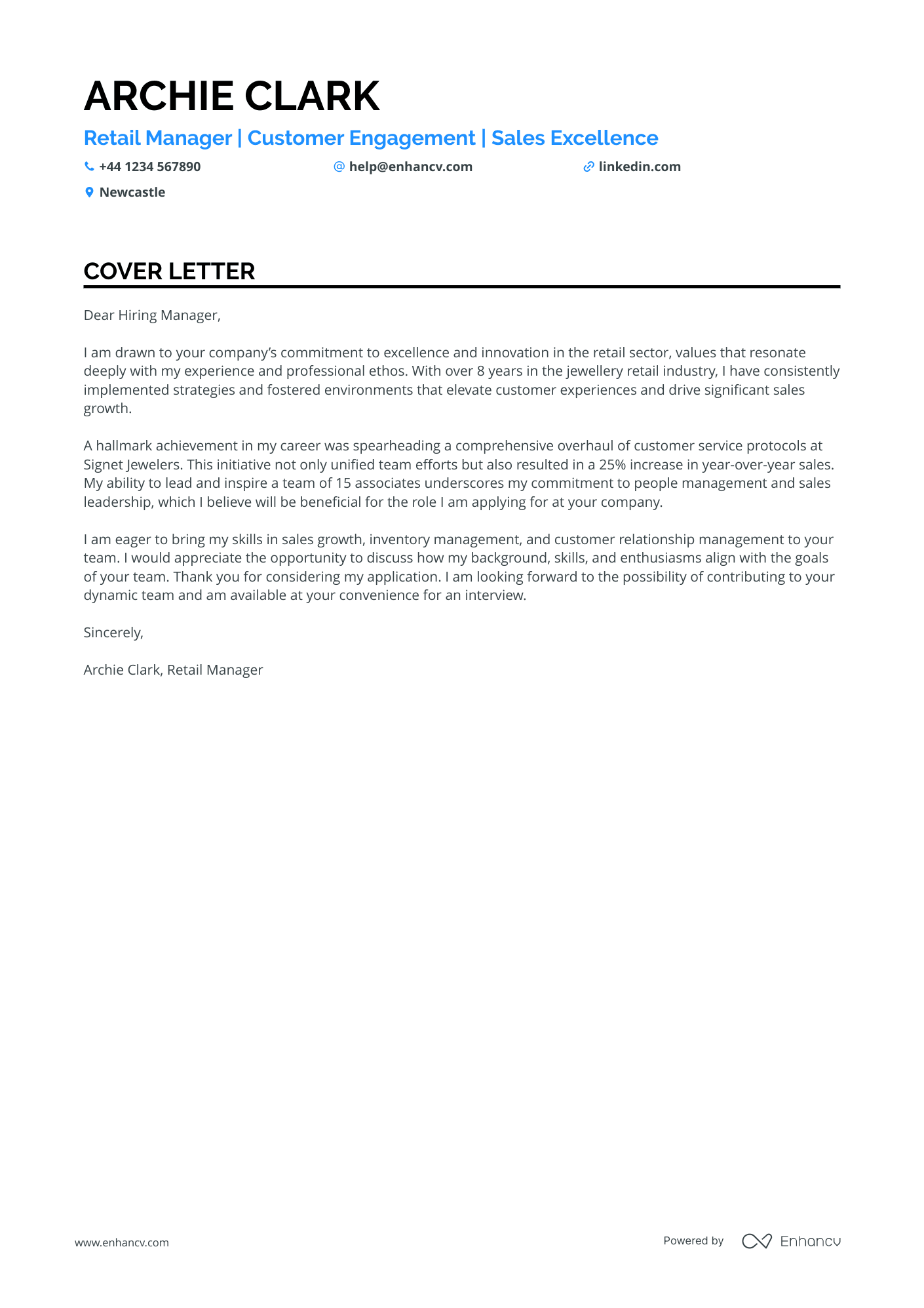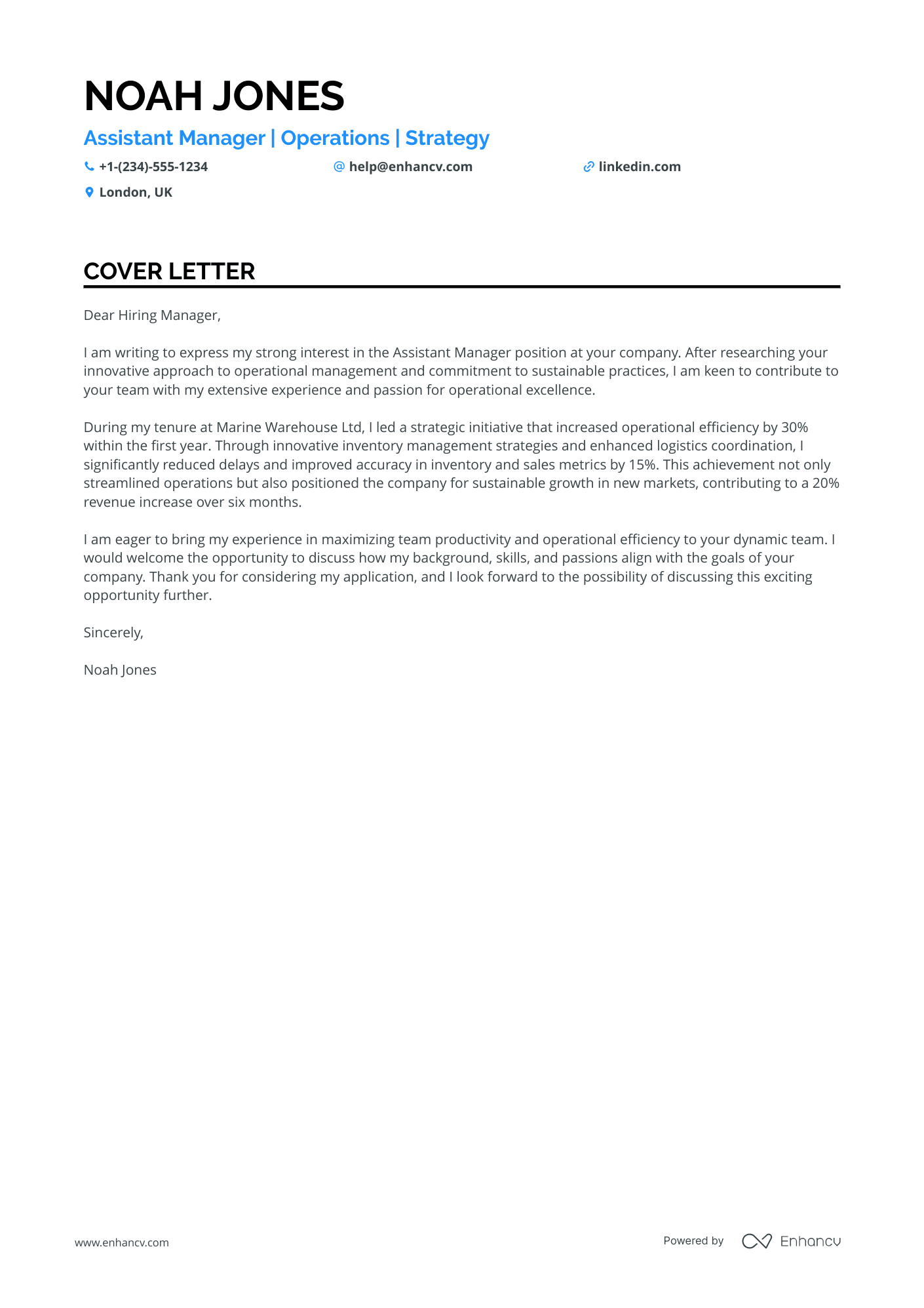You’ve just sent the same cover letter to 60 different job roles, all beginning with “Dear Sir or Madam” and ending with 'Yours sincerely.'
Bad news: you may have just missed your chance to stand out, as generic cover letters are a very common pitfall in job applications.
Did you know recruiters typically shortlist candidates based on how well they meet the job criteria? Failing to address the key requirements can cost you the role.
In this guide, we’ll show you how to tailor your cover letter to align with the job advert or company, ensuring you showcase your value as a candidate.
Cover letter examples for retail manager
By Experience
Senior Retail Manager
- Relevant Experience: The cover letter highlights Isaac's practical experience in process management and governance, combining roles at significant financial institutions like Barclays and Lloyds Bank, which is crucial for a Senior Associate Process Manager position.
- Certifications: Emphasising the Lean Six Sigma Green Belt and Certified Information Privacy Professional (CIPP) certifications adds credibility, showcasing specialised knowledge in process optimisation and data protection.
- Achievements: Presenting quantifiable achievements, such as enhancing process metrics by 30% and boosting revenue by £500k, demonstrates Isaac's ability to deliver measurable results, a vital aspect for this role.
- Education: Mentioning advanced degrees, specifically a Master’s in Data Management, underscores a strong educational background that supports Isaac’s technical expertise in data governance, appealing to employers in this field.
Assistant Retail Manager
- Highlighting Leadership Skills: The cover letter effectively showcases leadership and management skills, particularly through the increased sales by 25% at a previous role and leading a team to improve productivity and customer engagement.
- Community Engagement Experience: Emphasising community engagement initiatives, such as coordinating outreach events and collaborating on sustainable fashion shows, aligns well with the focus on sustainable fashion and community involvement.
- Certificates and Workshops: The inclusion of relevant courses, like the Retail Management Certification and the Sustainable Fashion Workshop, underscores a commitment to professional development and expertise in both general and niche areas of retail.
- Emphasis on Achievements: Quantifiable achievements, such as increasing processing speed for donations by 15% and achieving a 95% customer satisfaction rate, are highlighted, demonstrating a results-oriented approach.
Junior Retail Manager
- Highlight Relevant Experience: Emphasising past experience as a Retail Sales Associate at Currys and Sales Intern at Samsung establishes credibility and demonstrates a strong foundation in relevant sales roles.
- Showcase Achievements and Contributions: Clearly articulating specific achievements (such as exceeding sales targets, implementing successful marketing campaigns, and improving customer satisfaction rates) is key to illustrating value to potential employers.
- Include Relevant Skills and Education: Mentioning a Bachelor of Arts in Business Management and courses like the Retail Management Certificate and Sales Techniques Workshop adds value and shows a commitment to continuous learning and professional growth.
- Convey Passion and Goals: Expressing a passion for innovative retail strategies and digital marketing while outlining personal career goals can set the candidate apart as motivated and forward-thinking.
By Role
Retail Operations Manager
- Industry-Relevant Experience: Demonstrating over 10 years of experience in retail operations, with a focus on team leadership and process optimisation, showcases the candidate’s deep understanding of the industry.
- Tangible Achievements: Quantifying achievements such as a 20% sales increase and a 15% reduction in operational costs provides concrete evidence of the candidate's impact and effectiveness in previous roles.
- Strategic Initiatives: Highlighting strategic projects, such as the successful launch of new store locations and developing comprehensive training programmes, aligns the candidate’s skills with potential growth objectives in a new role.
- Educational Background: Featuring degrees in Business Administration and Retail Management indicates a solid foundation in both strategic and practical aspects of retail operations, valuable for an Operations Manager position.
Retail Store Manager
- Emphasising Relevant Leadership Experience: The cover letter effectively highlights Harper Webb's extensive experience in leadership roles, particularly in managing large teams and driving cultural and operational improvements.
- Quantifying Achievements: The use of specific metrics, such as increasing customer satisfaction by 15% and reducing operational costs by 10%, provides concrete evidence of the applicant’s contributions and effectiveness in previous roles.
- Showcasing Key Skills: The cover letter aligns Webb’s skills with the requirements of a Store Manager role, such as P&L Management, KPI Analysis, and Customer Experience, ensuring relevance to potential employers.
- Educational and Professional Development: Mentioning advanced education and additional courses, such as an MBA and retail management training, underscores the applicant's commitment to continuous growth and industry knowledge.
Retail District Manager
- Highlight measurable achievements, such as the 20% increase in sales revenue and 30% reduction in inventory discrepancies, to demonstrate a strong track record of success in retail management.
- Emphasise skills relevant to the District Manager role, such as operational efficiency, team leadership, and strategic decision-making, which are crucial for driving performance across multiple store locations.
- Incorporate experiences from prior management roles that directly relate to the responsibilities of a District Manager, showcasing advanced leadership and team coordination capabilities.
- Include education background and relevant professional development courses, such as a Master's degree and certifications in leadership and data analytics, to underscore the foundation of knowledge vital for high-level retail oversight.
Retail Sales Manager
- Proven Experience and Achievements: The cover letter emphasises over ten years of experience in the motor industry, highlighting significant achievements like a 30% sales increase and a key role in strategic digital tool development.
- Leadership and Team Management: Demonstrates strong leadership skills with examples like leading a team to achieve a 25% sales increase and improving team satisfaction scores by 12% through consultative management.
- Data-Driven Decision Making: Highlights data-driven strategies that led to increased sales operations efficiency by 35%, showcasing the ability to use analytics for effective decision-making.
- Customer Service Excellence: Repeatedly mentions initiatives that drastically improved customer service and satisfaction, such as reducing inquiry response time by 40% and enhancing customer follow-up efficiency through CRM implementation.
Retail Procurement Manager
- Highlighting Specific Achievements: The cover letter effectively underlines key accomplishments, such as a 30% reduction in procurement costs and negotiating £2M in savings, which demonstrate the candidate's ability to drive significant financial savings.
- Relevant Experience: It showcases relevant roles and responsibilities held at prominent companies like Debenhams and Marks & Spencer, thereby establishing credibility and showcasing progression within the procurement field.
- Mention of Certifications: The inclusion of certifications like the "Certified Procurement Professional" from CIPS is crucial, as it affirms the candidate's expertise and commitment to continuous professional development in strategic sourcing.
- Emphasis on Stakeholder Management Skills: The emphasis on strong stakeholder engagement skills and the ability to collaborate with cross-functional teams is essential for the role of a Procurement Manager, highlighting the candidate's aptitude for fostering valuable partnerships.
Retail Merchandising Manager
- Clearly highlights a strong background in the organic food industry, which is essential for a role focused on brand growth in organic/natural foods.
- Emphasises successful strategic partnerships and measurable achievements, like a 35% increase in market presence, showcasing a results-driven approach.
- Showcases leadership and team training expertise by mentioning the training and improvement of a team of merchandisers, which is crucial for retail roles.
- Effectively communicates understanding of the market through past experiences in brand development and market analysis, indicating an informed approach to sales strategy.
Retail Training Manager
- Specific Certifications and Courses: Highlighting the "Retail Training Mastery" certification by the CIPD and the "Advanced Instructional Design" course demonstrates specialised knowledge and dedication to professional development in the field of retail training.
- Tangible Achievements: Clearly stating the percentage improvements and savings, such as a 25% increase in training satisfaction scores or a 20% reduction in training costs, provides concrete evidence of effectiveness and impact in past roles.
- Relevant Experience: Detailing specific roles and responsibilities at well-known retail companies like Nike, Zara, and Marks & Spencer aligns with industry expectations and showcases a robust track record in retail training and strategic partnerships.
- Passion for Field: Emphasising passions such as "Retail Innovation" and "Cultural Exchange" not only reflects personal interest but also aligns with the core responsibilities of developing diverse and effective training programs.
Retail Category Manager
- Experience in Leading Roles: The cover letter effectively highlights Oscar's experience in leadership roles at well-known companies like Morrisons, Tesco, and Sainsbury’s, showcasing a solid track record in the food retail industry.
- Quantifiable Success: Oscar presents concrete achievements, such as a 30% profit increase and a 20% cost reduction, demonstrating effectiveness and impact in previous roles.
- Specific Skills and Expertise: The cover letter covers relevant skills such as category strategy, supplier negotiation, and sales maximisation, which are crucial for a Category Buying Manager role.
- Commitment to Sustainability: Oscar’s passion for sustainable practices is highlighted, aligning with many modern company values focusing on environmental impact.
Retail Supply Chain Manager
- Highlight accomplished achievements: The cover letter effectively showcases Daisy's ability to achieve significant improvements in delivery timelines and product quality, which is crucial for a Supply Chain Manager role.
- Emphasise data-driven skills: By emphasising her advanced forecasting tools utilisation and data analysis techniques, Daisy highlights her capacity to make informed, analytical decisions—an essential skill in retail supply chain management.
- Mention industry-specific education: Listing her educational background in Supply Chain and Logistics Management from renowned institutions adds credibility and aligns with her role to substantiate her expertise in the field.
- Illustrate cross-functional leadership: Daisy's experience collaborating with marketing and cross-functional teams demonstrates her capability to integrate supply chain strategies with company-wide goals, a critical aspect for successful management and process improvements.
Retail Inventory Manager
- Highlighting Achievements: The cover letter effectively emphasises significant achievements, such as reducing inventory discrepancies by 20% and increasing stock turnover rate by 15%, which demonstrate the applicant's impact in previous roles.
- Relevant Skills and Certifications: The inclusion of specific skills such as "Process Improvement" and certifications like "Professional Inventory Management Certification" aligns with the specialised requirements of a Retail Inventory Control Specialist role.
- Cross-Functional Collaboration: The mention of working with logistics and sales teams highlights the applicant's ability to collaborate across departments, a valuable trait for enhancing inventory management practices and streamlining processes.
- Education and Continuous Learning: Presenting academic credentials, such as a Master's in Supply Chain Management, along with ongoing professional development courses, reinforces the candidate's commitment to expertise in inventory control and data management.
Retail E-commerce Manager
- Tailored Experience: The cover letter effectively highlights relevant experience in operational and logistics roles, showcasing an upward career trajectory that aligns with the Assistant Manager position.
- Specific Achievements: Quantifiable successes, such as increasing operational efficiency by 30% and reducing supply chain expenses by 10%, demonstrate the candidate's proven track record and practical impact in previous roles.
- Relevant Qualifications: The inclusion of relevant educational qualifications, such as an MBA and targeted courses in operational management and supply chain logistics, bolsters the candidate's expertise in core areas necessary for the role.
- Targeted Skills: Emphasising skills like inventory management, staff training, and strategic planning underscores the candidate's ability to perform key responsibilities of the job effectively.
Retail Customer Service Manager
- The cover letter effectively highlights the candidate's quantifiable achievements, such as increasing annual sales by 20% and enhancing customer feedback scores by 25%, which are crucial metrics for a Salesfloor Manager role.
- Specific skills, including 'Customer Service Management' and 'Team Leadership', are clearly outlined in the summary and skills section, aligning well with the responsibilities of a Salesfloor Manager.
- The inclusion of relevant certifications, like 'Advanced Customer Service Strategies', demonstrates a proactive approach to professional development in key areas of customer satisfaction and engagement.
- A clear demonstration of leadership abilities is showcased through experiences like spearheading recruitment processes and implementing training programmes, which are vital for managerial roles.
Retail Visual Merchandising Manager
- Emphasise your contributions to increased sales and customer satisfaction, as demonstrated by achieving a 15% increase in stock accuracy and a 12% boost in customer satisfaction scores.
- Highlight leadership skills by mentioning your experience in team development and impactful onboarding programmes that accelerated productivity by 30%.
- Demonstrate your capability in process optimisation with achievements such as a 25% reduction in unloading times and a 20% decrease in inventory discrepancies.
- Include specific skills and certifications like Advanced Retail Management and Efficient Stock Management courses to showcase your continuous professional development and expertise in the field.
Retail Loss Prevention Manager
- Highlight Relevant Experience: Emphasising practical experience as a Loss Prevention Associate and Retail Security Officer, showcasing significant impact like a 30% shrink reduction at Tesco PLC and co-ordinating with law enforcement for successful theft prosecutions.
- Focus on Achievements: Detail specific achievements such as winning a Performance Excellence Award for achieving the highest shrink reduction in the district, demonstrating a track record of tangible results.
- Mention Relevant Education and Courses: Include relevant educational qualifications such as a Master's in Risk Management and certification in Advanced Loss Prevention Techniques to underscore industry knowledge and specialised skills.
- Emphasize Key Skills: Clearly state critical skills related to the role, such as investigation techniques, evidence management, and risk assessment prowess, supported by practical work experiences to establish credibility.
Retail Product Manager
- Quantitative Achievements: The cover letter effectively highlights quantifiable achievements, such as improving efficiency by 40% and increasing revenue by 25%, which demonstrate the candidate's proven track record in operational success and strategic problem solving.
- Cross-Functional Leadership: By mentioning leading cross-functional teams for product launches and improving team collaboration by 50%, the candidate showcases their ability to drive cross-departmental synergy, a key skill for a Product Operations Manager.
- Strategic Frameworks and Problem Solving: The application of strategic initiatives that align with business needs, as evidenced by the 50% improvement in team collaboration, reflects the candidate’s ability to innovate and implement effective strategies in complex environments.
- Technical Proficiency: Emphasising proficiency in SQL and data-driven decision-making highlights the candidate's capability to utilise technical skills for analytics and insight generation, crucial in driving informed operations management decisions.
Retail Quality Assurance Manager
- Highlighted Certifications: The cover letter mentions the "Certified Professional-Food Safety (CP-FS)" and "Food Protection Manager Certification" qualifications, which underscore advanced expertise in food safety standards crucial for a role in food quality assurance.
- Achievements in Compliance and Training Initiatives: Edward emphasises his success in reducing compliance incidents and enhancing training programmes, demonstrating his capability to drive improvements and efficiency in food safety operations.
- Experience with Major Retailers: His experience with renowned companies like Tesco and Sainsbury's adds credibility to his background, reflecting exposure to high standards and rigorous safety protocols expected in the industry.
- Strong Crisis Management Skills: Edward's ability to respond effectively to major food safety crises underlines his crisis management proficiency, which is vital in maintaining company reputation and consumer safety.
Retail Manager cover letter example
Archie Clark
Newcastle
+44 1234 567890
help@enhancv.com
- Highlighting relevant industry experience is crucial to establish credibility and showcase understanding of sector-specific challenges and opportunities.
- Emphasizing leadership achievements, such as managing teams or implementing successful strategies, effectively demonstrates capability for managing roles in retail environments.
- Quantifying accomplishments, like noting specific sales increases, provides concrete evidence of success and impact, making the application stand out.
- Expressing enthusiasm for the company’s values and goals creates a connection and shows that you’ve researched and align with the company’s mission.
Importance of cover letters in the United Kingdom
A well-crafted cover letter can significantly strengthen your job application by emphasising why you’re an ideal fit.
Here are some reasons why it matters:
- Personalisation: Employers expect your cover letter to demonstrate how your skills and experience align with the company’s needs and/or values.
- Addresses what is omitted from your CV: If your career path includes gaps or changes, your cover letter is the best place to address these positively and explain their relevance.
- Opportunity to stand out: Many applicants have similar qualifications, so a tailored cover letter can show your unique attributes and experience.
What UK employers expect from a cover letter
When writing your cover letter for a UK employer, it’s important to keep several things in mind. First, you need to conduct a thorough research, which includes reading up on the company’s website, recent news, and their presence on social media. Understanding the company’s latest achievements and its overall mission will allow you to tailor your letter to their specific needs.
Next, focus on the company’s core values. Whether they value teamwork, innovation, or community involvement, highlighting how your own experience aligns with these principles is essential.
Finally, don’t forget to match your skills to the job’s requirements. Study the job description carefully and pick out the most important qualifications or competencies. Then, provide evidence of how you meet those criteria with concrete examples from your past work experience.
How to format a retail manager cover letter
Have you ever wondered about the formatting and structure of your cover letter?
Read on to discover some guidance from industry-leading professionals:
- Within the header, include your address and contact details, the employer's name and address, and the date, followed up by a personalised salutation.
- The body should should consist of an opening paragraph, middle paragraphs expanding on your unique experience and skills, and a closing paragraph.
- End with a formal sign-off and your signature.
- Choose modern fonts such as Volkhov, Chivo, or Bitter instead of the more traditional Arial or Times New Roman.
- All of ENhancv's templates maintain single-spacing with approximately 1-inch (2.5 cm) margins on all sides to ensure a neat presentation.
- Always send your cover letter as a PDF to keep the formatting intact and prevent any edits once submitted.
Your CV and cover letter maintain consistent formatting. Use the same fonts, margins, and style to create a professional and cohesive look for your application.
Finally, remember that Applicant Tracking Systems (the software some companies use to align job keywords to your experience, also known as ATS) do not read cover letters–it's intended solely for recruiters. Make it stand out by highlighting your achievements and relevant skills for the role.
How to write your retail manager cover letter salutation
In a world of AI and instant prompts, taking the extra time to personalise your cover letter truly makes a difference.
Address the hiring manager directly with a customised greeting (e.g., 'Dear Mr Bond', 'Dear Ms Penny').
You can often find their name on LinkedIn (under the job listing or by searching) or in the ‘About’ or ‘Meet the Team’ section of the company's website. If in doubt, you can also contact the reception for assistance.
If you can't find the name, rather than using 'Dear Sir or Madam', opt for something more personal, such as 'Dear [Company Name] Hiring Manager'.
How to write your retail manager cover letter intro
It's never a bad time to show enthusiasm about the role, company, or team in your cover letter introduction.
Begin by sharing one or two aspects that genuinely excite you about the position—whether it's the company culture, specific responsibilities, or the team's past achievements.
Your enthusiasm demonstrates that you'll bring a strong work ethic, are eager to contribute, and are motivated to succeed.
How to write your retail manager cover letter body
You’ve personalised your greeting and introduction—now it’s time to focus on writing the body of your cover letter.
Instead of listing off skills and responsibilities from your CV, focus on one career highlight that’s relevant to the role.
Use your hard and soft skills, success metrics (e.g., percentages or sales figures), and the long-term impact it had on the company.
A concise, well-told story centred on your value as a candidate will make a strong impression.
How to write a closing paragraph
Now we’ve reached the closing paragraph of your cover letter. You might be tempted to end with a simple Yours sincerely, but don’t!
Instead, finish with a promise to enhance the company’s performance metrics (backed by your hard and soft skills), to develop as a professional, or something else that holds significance for the organisation. Whatever you choose, ensure to stand behind your words and be remain sincere.
Don’t forget to include a call to action, encouraging recruiters to suggest the best time to follow up for an interview or update.
Conclusion
A well-crafted cover letter can significantly enhance your job application and set you apart from other candidates. Begin by personalising your message to the hiring manager and connecting your experiences to the company's values.
Emphasise your key accomplishments that reflect your skills and passion for the role, while maintaining a professional tone throughout. Ensure that your cover letter and CV present a unified and polished image to maximise your chances of success.
